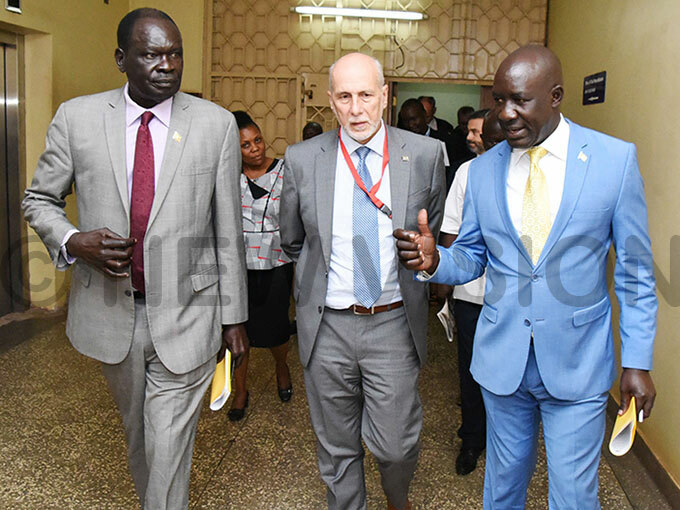Uganda now able to detect, avert disaster outbreaks
Uganda records over 15,000 losses and damage due to disasters.
DISASTER MANAGEMENT
Uganda can now detect and avert disaster, months before it occurs, Hilary Onek, the Minister for relief, disaster preparedness and refugees, has said.
While hosting a high profile EU delegation, Onek flanked by senior ministry officials said that they have made long strides in disaster management and have moved from being reactive to outbreaks to being able to detect and forecast natural occurrences before they wreak havoc on Ugandans.
"When I joined the ministry, this department (disaster management) was reactive. It was totally inadequate. We had to change the approach and now we can see disaster in advance before it occurs except for earthquakes but we are working to see that we can find a way of seeing seismic activities early before the earthquake," he said Wednesday.
Tasks for the team at the disasters department include: coordination of all actors in the field of early warning, risk reduction, disaster preparedness, and management monitors include floods, drought, road accidents, crop pests and diseases, lightning, conflicts, environmental degradation, fires, wind storms and hailstones, human epidemic diseases and livestock pests and diseases.
Onek added that operations at the department, located at the Office of the Prime Minister, include: hazard profiling, disaster forecasting, preparedness, early action and emergency response.
He gave an example of how they were quick to detect the impending outbreak of famine in Karamoja, mobilised resources in time and made sure no one went hungry in the areas at risk in the sub-region.
"We have in place hazard and risk profiles of all the 127 districts in the country. This means we know the risks and possible disasters that can occur in any part of Uganda," he said.
He noted that they have also established disaster monitoring systems for some of the common hazards such as drought, floods and landslides.
According to John Martin Owor, the commissioner in charge of disaster preparedness and management at the ministry, 85% of disasters in Uganda are water-related.
Annually, Uganda records over 15, 000 losses and damage due to disasters.
Owor said, among other things, the department has resettled over 500,000 people who were displaced by the Joseph Kony rebel group, trained 85 districts on disaster preparedness, and carried out humanitarian demining after the LRA insurgency freeing over 1,300sqms of land in Lamwo, Amuru, Kasese and Bundibugyo districts.
He said they have a fully operational National integrated Early Warning System and the National Emergency Coordination Centre (NECOC) which is operational 24 hours. The center collects daily disaster data from all over the country.
However, Onek noted that there are still gaps in disaster management that need to be filled. He noted that there is need to build the human resource capacity of the vital institutions in Geographic Information System (GIS) and remote sensing in the areas of food security, agricultural production, drought monitoring, environmental degradation and flooding.
Musa Ecweru, the minister of state for disaster preparedness, stated that NECOC needs to be fully equipped to make it robust enough to manage the disasters in the country.

"We want to increase our capacity to predict, our capacity to respond with precision, to coordinate. We need to predict what is likely to happen with a bit of mathematical precision, respond when it does happen in a manner that is devoid of guesswork and be more coordinated in the way we respond," he said.
He asked the EU delegation led by ambassador Atillio Pacifici, to equip them with the skills to detect deaths in the lakes, Victoria, Albert and Kyoga, noting that many people have perished in the waters undetected.
"Help us to remove those teething challenges so that we can remain robust in the way we respond to emergencies," he said.
In response, Pacifici pledged support to Uganda's efforts to manage disaster outbreaks, saying they are willing to share knowledge and experiences on how other countries have been able to mitigate the challenges of disaster.
"We have listened to your call and will soon be able to respond. We will convey the message and I am sure we will fill the remaining gaps," he said.
The EU delegation was also taken on a guided tour of the NECOC center where all the disasters are monitored and reported.
Related stories
Improve accountability in disaster response